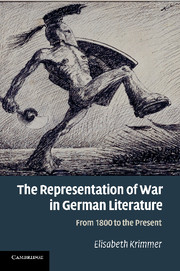
Book contents
- Frontmatter
- Contents
- Acknowledgments
- 1 Introduction
- PART I THE REVOLUTIONARY AND NAPOLEONIC WARS
- 2 The Revolutionary and Napoleonic Wars: overview
- 3 War and the sublime: Schiller
- 4 War and terror: Kleist
- PART II THE FIRST WORLD WAR
- PART III THE SECOND WORLD WAR
- PART IV YUGOSLAVIA AND IRAQ
- 14 Conclusion
- Notes
- Bibliography
- Index
3 - War and the sublime: Schiller
Published online by Cambridge University Press: 06 July 2010
- Frontmatter
- Contents
- Acknowledgments
- 1 Introduction
- PART I THE REVOLUTIONARY AND NAPOLEONIC WARS
- 2 The Revolutionary and Napoleonic Wars: overview
- 3 War and the sublime: Schiller
- 4 War and terror: Kleist
- PART II THE FIRST WORLD WAR
- PART III THE SECOND WORLD WAR
- PART IV YUGOSLAVIA AND IRAQ
- 14 Conclusion
- Notes
- Bibliography
- Index
Summary
SCHILLER'S WARS
To the young Schiller, warfare and the military formed an integral part of everyday life. Schiller's father, Johann Kaspar Schiller (1723–96), was a surgeon and captain in the Württemberg army, and his godfather Philipp Friedrich Rieger (1722–82), who was to become the director of the Hohenasperg prison, first secured Duke Carl Eugen's favor by substantially enlarging the Duke's army through his brutal recruitment methods. Schiller himself was educated in the Karlsschule, an institution that imposed military discipline on its students. After his graduation, he worked as a regimental doctor, but does not seem to have taken to military life. Determined to become a writer, Schiller broke with his sovereign Carl Eugen who did not look kindly on his subject's artistic aspirations. When Schiller later drafted a letter of reconciliation, the request for permission to wear civilian clothing was listed right along with the wish to publish and travel without restrictions.
During his lifetime, Schiller's eventual home, the duchy of Weimar, was largely spared by the war, although its sovereign Duke Carl August possessed considerable military ambition. Carl August participated in the first campaign of the war, the invasion of France in August of 1792, and called upon his friend and servant Johann Wolfgang von Goethe to accompany him on this venture. Goethe, who followed Carl August much to his own dislike, witnessed the defeat and catastrophic retreat of the allied forces, but did not record his experiences until almost thirty years after the event.
- Type
- Chapter
- Information
- The Representation of War in German LiteratureFrom 1800 to the Present, pp. 27 - 45Publisher: Cambridge University PressPrint publication year: 2010
Save book to Kindle
To save this book to your Kindle, first ensure coreplatform@cambridge.org is added to your Approved Personal Document E-mail List under your Personal Document Settings on the Manage Your Content and Devices page of your Amazon account. Then enter the ‘name’ part of your Kindle email address below. Find out more about saving to your Kindle.
Note you can select to save to either the @free.kindle.com or @kindle.com variations. ‘@free.kindle.com’ emails are free but can only be saved to your device when it is connected to wi-fi. ‘@kindle.com’ emails can be delivered even when you are not connected to wi-fi, but note that service fees apply.
Find out more about the Kindle Personal Document Service.
- War and the sublime: Schiller
- Book: The Representation of War in German Literature
- Online publication: 06 July 2010
Save book to Dropbox
To save content items to your account, please confirm that you agree to abide by our usage policies. If this is the first time you use this feature, you will be asked to authorise Cambridge Core to connect with your account. Find out more about saving content to Dropbox.
- War and the sublime: Schiller
- Book: The Representation of War in German Literature
- Online publication: 06 July 2010
Save book to Google Drive
To save content items to your account, please confirm that you agree to abide by our usage policies. If this is the first time you use this feature, you will be asked to authorise Cambridge Core to connect with your account. Find out more about saving content to Google Drive.
- War and the sublime: Schiller
- Book: The Representation of War in German Literature
- Online publication: 06 July 2010

